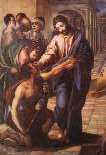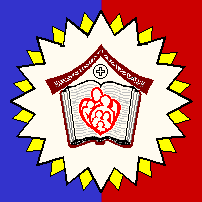 Dear Friend,
Another interesting story -- about the healing by Jesus of the man born blind -- is found in the Gospel according to John 9:1-41.
What are the highlights of the Gospel? Please read it slowly to your family and go over each highlight. Ask yourself, and talk about what Jesus meant in each of these?
Dear Friend,
Another interesting story -- about the healing by Jesus of the man born blind -- is found in the Gospel according to John 9:1-41.
What are the highlights of the Gospel? Please read it slowly to your family and go over each highlight. Ask yourself, and talk about what Jesus meant in each of these?
-
The disciples wanted to know who sinned that the man was born blind. The Jews believed that one’s blindness is the result of sin (v.34). How did Jesus answer? "Neither he nor his parents sinned; it is so that the works of God might be made visible through him." That grown man was blind since birth. How he must have suffered, but see how he had reacted and accepted his fate through the works of God.
-
The man born blind did not even know Jesus, neither did he ask Jesus to heal him.
-
Jesus made clay with His saliva, touched the eyes of the man born blind with it, and ordered the man to wash in the pool of Siloam. The man born blind followed Him. What made him follow Jesus? A blind person is a very sensitive person. This man born blind must have perceived something in this man who touched him. There was something he felt different in His voice, in His touch.
After washing in the pool of Siloam, he was healed. Again, it was all grace.
-
The neighbors and those who knew the man to be born blind were amazed when they saw he could see. It was possible they had not seen what Jesus did earlier. So they asked the man born blind.
-
Listen to how he referred to "the man called Jesus." He just did not know Him.
-
These people wanted answers from the Pharisees so they brought the healed man to them. Upon hearing the man born blind, the Pharisees did not believe that Jesus could have healed him and at a Sabbath at that, but their questionings made the man born blind reflect on the "man called Jesus." He now recognized Him as a "prophet".
-
The Pharisees had to call the parents of the man born blind. They suspected that this healed person was another man. However, the parents were too careful to answer but just admitted he was their son for fear of being thrown out (excommunication). The parents referred the Pharisees to their son.
-
It was the turn of the son born blind to boldly and proudly reply to the Pharisees. Listen to his reply: "If he (Jesus) was a sinner, I do not know. One thing I do know is that I was blind and now I see…. I told you already and you did not listen. Why do you want to hear it again? Do you want to become his disciples, too?"
The man born blind had become a disciple of Jesus. He was thrown out (v.34).
Read again the closing verses of the Gospel (v. 35-41).
-
The healed man now called Jesus his "Lord". He said, "I do believe, Lord."
-
The Pharisees could not see what Jesus did as it was done on a Sabbath (v.14). They had been blinded by their belief on their interpretation of the Law of Moses about Sabbath. Please read Luke 13:15 and 14:5 on the explanations of Jesus about Sabbath.
Meditation ~
Put yourself in the place of the man born blind.
What is your "blindness" that prevents you from following Jesus?
Does your not knowing Jesus cause your "blindness"?
With this awareness of your "blindness," feel the presence of the man called Jesus that you know Him better.
Reflect on the man who touching your "eyes" that you may see.
Feel His love as the man born blind did.
Feel the water of Siloam on your face and slowly sensing the "light" entering your "eyes" for the first time.
It is all grace.
Feel the joy in seeing the truth – the will of Jesus for you that you continue to "see."
And finally, meet Jesus, your Lord, face to face.
Contemplation ~
Continue spending time in silence just saying again and again:
"I do believe, Lord."
"I do believe, Lord."
"I do believe, Lord."
"I do believe, Lord." ...
Family Response ~
Like the man born blind, describe how your "blindness" was healed.
Conclude with a prayer for each other.
Joe & Charito


THE CATHOLIC ARCHDIOCESE OF MANILA'S
ONLINE RESOURCE FOR FAMILY MINISTRIES
www.simbahayan.org
servants@simbahayan.org
|